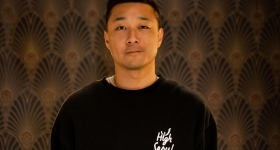Full disclosure: This past weekend, I spent my Saturday night in New Jersey in the company of something like tens of thousands of screaming tween girls, their equally excited mothers, and plenty of iPhone-wielding dads who gave each other knowing looks across the aisle. A friend of mine was working on a story about Justin Bieber, or more specifically, his signature hair swoosh, and so as part of the reporting process, I found myself at the Prudential Center in Newark, head bobbing to Bieber’s tunes and marveling at the epic proportions of a YouTube craze gone viral.
For more than two hours, the 16-year-old sang, danced, and charmed the audience (at one point serenading one lucky fan with flowers and hit song “One Less Lonely Girl”), lighting up the stage with his aw-shucks charisma and versatile musicality. In a performance full of video montages and smoky ballads, though, one thing was clear: the show was far from one-man.
Bieber wasn’t the only one who took center stage that night. His backup singers, Filipino-American R&B group Legaci, wowed the crowd with their smooth voices and harmonic finesse in their own set about halfway through the show. Seeing their faces projected onto the larger-than-life monitors above and around the stage was not only heartening, but also, in many ways, a moment of true pride.
“Hey, they’re all Asian!” a tween pointed out behind me, and though the comment made me chuckle (she said it in an incredulous tone rather than a derisive one), it also made me think.
Normalizing an Asian American presence in the mainstream music scene -- and especially with an artist as widely received as Bieber -- is a large step forward for Asian Americans in the entertainment industry. Even with acts like Jin Tha MC of BET fame and the ill-fated William Hung of American Idol popularity, Asian Americans still haven’t been wholeheartedly embraced by radio’s Top 40.
Christine Balance, a professor of Asian American Studies at the University of California, Irvine, pointed out in a New York Times article earlier this year that “African Americans are foundational to US popular culture, and for Latinos there’s the adjective ‘Latin’ music that’s used to describe a variety of musical forms. But Asians are still seen as foreign or alien to mainstream America.”
So how do you market a group like Legaci? The foursome, who have played the stages of Saturday Night Live, Ellen and tonight, Madison Square Garden, behind Beiber, started singing together in 1997, influenced by R&B heavyweights like Boyz II Men. They’ve auditioned in numerous TV talent competitions like American Idol and America’s Got Talent. And they’ve steadfastly recognized the challenges they face in trying to break into the wider market.
“We tried them all,” Micah Tolentino, one of the founders of the group, said in the New York Times article. “And they all said the same thing, ‘You guys are great, you have great voices, but you’re not what we’re looking for.’” Eventually, it sank in that “what we’re looking for” might not have anything to do with musical talent, and everything to do with appearance in an industry where image sells.
So the group took to a more grassroots approach via YouTube. Just two days after their video rendition of Bieber’s “Baby” went up, they were contacted by Scooter Braun, Bieber’s manager. And within a week, they were flying out to New York for some MTV airtime.
And Saturday, when their faces loomed over the stadium, I couldn’t help wondering how long it would be before the average tween recognized the group as more than just Bieber’s backup. With YouTube serving as the launch pad for so many Asian American artists, there’s hope for an impending surge.
Said Delfin Lazaro, another member: “We know how long it’s taken African-American groups to be totally accepted by the mainstream. That will happen for Asian Americans too. We want to open that door, and then we’ll bring everyone with us.”









Comments